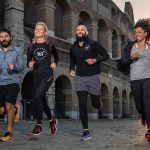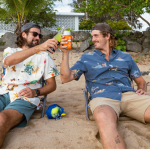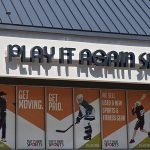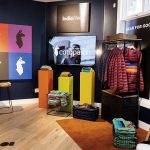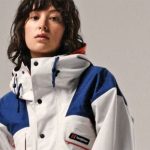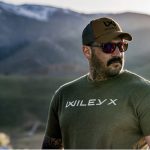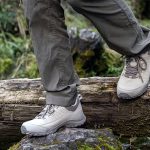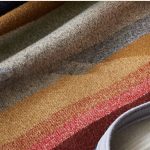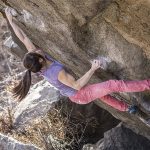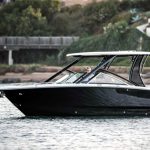When she was hired as CEO of Confluence Watersports last December, Sue Rechner told Outdoor Business that she felt the companys brands were “underdeveloped.” [That article ran in the January 2008 issue.]
Since then, Rechner has spent much of her time on the road talking to dealers at paddling shows across the country. Between trips in early April, she sat down with Outdoor Business at Confluences headquarters in Easley, SC, and offered a peak under the hatch of the paddling industrys biggest player.
During that meeting, which included a tour of the companys recently revamped manufacturing facilities, Rechner estimated that Confluence has completed “about 50 percent” of a turn-around initiated by its owner, American Capital Group. She is also convinced that the company has “radically” improved quality and that dealers are noticing.
“It takes awhile to turn a battleship around in a bathtub, but I think we are probably at the 50 percent mark,” Rechner says. “Our goal is to show the new face in totality to the market at the August Outoor Retailer show.”
Much of the dissatisfaction with Confluence has come from independent dealers who believe that sales to chain stores such as Dicks Sporting Goods and MC Sports have cannibalized their business without bringing a significant number of new, long-term paddlers into the market. Big chain stores, meanwhile, seem pleased with Confluences ability to deliver specially made boats at lower price points. In early April, MI-based MC Sports named Confluence as its hardgoods vendor of the year for helping the retailer set new paddling sales records. Confluence accomplished this by promptly shipping units of a custom-made recreational boat to replenish inventory after spring broke early.
How Confluence balances the sometimes conflicting needs of these two channels will be critical to achieving both its own goals and those of the wider paddle sports industry. As the categorys largest player, Rechner acknowledges Confluences responsibility to lead the way.
The companys new ability to make twice as many boats with the same number of rotomolding machines will go a long way toward keeping both channels happy, she says. Her role will be to rebuild the companys leadership team and brand portfolio, which includes Dagger and Wavesport whitewater kayaks, Mainstream, Perception and Wilderness Systems flat-water kayaks, Mad River Canoe, AT paddles and Harmony accessories.
The team-building is well underway: the company recently hired a new production manager and a new materials director, added CAD-CAM designers, and has built a quality control team. Rechner expects to name a new head of sales late this month, and new product managers prior to Outdoor Retailer Summer Market. Cheri McKenzie joined Confluence in early April as CMO, a title she held while working with Rechner at Victorinox Swiss Army, Inc., last year.
While Rechner is still learning the names of the dozens of boats that Confluence makes, she has become known in Easley as a hands-on manager who knows employees first names and spends a lot of time on the road listening to dealers. Among retailers, she is developing a reputation as a good listener-a trait that some dealers contend was sorely lacking until company chairman Tom Nathanson stepped in as interim CEO in mid-2007.
“Its very evident that they are trying, whereas before it was evident they did not care,” observes one influential dealer.
When not in Easley or on the road, Rechner visits a home in Connecticut, where shes inclined to drop in at Outdoor Sports in Wilton to chat with the owner. A former stand-out softball player who cycles, runs and gardens, she she also intends to add paddling to her repertoire as soon as the weather warms. Until then, she will pour her energy into another passion: rebuilding brands.
OB: How did your career at Victoronix Swiss Army prepare you to run Confluence?
Rechner: I am a brand builder in the consumer product world that takes a long-term view on rebuilding businesses and brands. At Victorinox Swiss Army, I was brought in primarily to rebuild and relaunch the global watch business. When I was hired in 2001, it had deteriorated to a very small business with a challenging product and distribution strategy. The elements of classic consumer products management that were instilled at Swiss Army would all be relevant to what Ive come in to take on at Confluence.
Weve got a business that has gone through extraordinary amounts of change and weve got an organization that owns incredible brands. Yet, for a multitude of reasons, it has deteriorated over the course of the last few years. The private equity firm that owns us made a decision in May/June of last year to invest and rebuild this business.
We started last year with the basic infrastructure and production improvements, which are significant. That has set us up now to do the external part of this process, which is rebuilding the face and the brands from a definition perspective-giving each brand its defined place, building the right product, creating marketing and advertising plans, and implementing a sales strategy that will allow us to capitalize on all the improvements we have made over last seven months.
OB: How exactly are the owners trying to implement
change at Confluence?
Rechner: They put a renewed emphasis on productivity and quality human capital management. All of the things put in place-including this massive project we undertook to optimize production in ways we have never done before-provided us with incredible infrastructure and the ability to be flexible and incredibly productive with the machinery. We have the ability, at this stage of the game, to mold twice as many boats as we ever could with the same equipment.
Its a difficult business because its very seasonal. In March through July everyone wants their boats and there are not many companies that can build all they need to build during those months because of limits and capacities on manufacturing. And its also incredibly difficult for any business, particularly in consumer products, to build everything in advance and always be right. Its difficult to accomplish that balancing act of building everything at the right time and, at same time, having enough capacity to fill orders on an as-needed basis.
OB: Do you participate in any outdoor sports?
Rechner: I played high school sports. I lettered in varsity for four years in three sports. I went on to play college softball. I played at Rutgers and attended the [softball] World Series twice in college and I have the little bats to prove it. Then I also played semi-pro softball for the Budweiser Belles who, of course, paid us in beer. Since entering the working world, Im a racquetball player. Im a runner. Im a cyclist. On the weekends I spend about every hour outdoors from sunup till sunset gardening.
OB: Whats the outlook for the paddling business right now?
Rechner: There is no such thing as a recession-proof business, but right now the trend line on kayaks and canoes is very positive. We are experiencing well into double-digit percent increases. We are having great success on sell-through, which is a great indicator of the health of the business.
For some reason, there is somewhat of an insulation for the paddle sports industry from this purported recession. The kayak/canoe industry is experiencing an uptick; a renewed interest in family activities which, I think, canoes and kayaks can dovetail into. I think people are day-tripping as opposed to jumping in planes and flying to Europe because its cost-prohibitive.
In difficult times, when everyone gets nervous, everybody goes back to activities they can feel good about. An activity where you can spend time with your family, that does not pollute the environment, and where you dont spend money. I think people retreat to those kinds of things, even if it does not personally impact them, because it makes them feel they are doing something to help themselves and settle things and ground everything back into a place that is peaceful. [Paddling is] like yoga on the water, unless you are one of those whitewater guys.
OB: Confluence currently sells to both large general sporting goods retailers and specialty stores. Will you change how you manage those relationships going forward?
Rechner: We are still undergoing an examination on how we will manage the distribution strategy for all of our brands. Because we have a strong portfolio of products, we will have the ability to keep our specialty dealers happy and successful, but at the same time balance it with some of the larger chain stores. Specialty dealers got us to the party and we have to continue to support them.
OB: You were recently quoted as saying you thought Confluence was “underdeveloped.” What did you mean?
Rechner: Weve got the most powerful brands and I just dont think we have maximized what they can be in the paddle sports world. Our first step is obviously to get the boats back on track, but we have a whole accessory category and we have a whole apparel category. We can touch on other parts of a persons life with accessories and products that are natural extensions of our brands in the kayak and canoe world. Globally, we have a really solid business, and the opportunity there for us to grow and expand the canoe and kayak category is incredibly significant.
OB: Pyranha recently began importing kayaks made in Thailand to the U.S. Are paddle sports manufacturing jobs vulnerable to offshore competition?
Rechner: Its definitely something thats on our radar. There have clearly been some companies that have sourced and built in the Far East and we do need to maintain competitiveness, but at same time, its going to be an evolution.
OB: Confluence has been issuing assurances to its dealer network, ever since the Watermark deal in 2005, that it would address its quality control issues. Why should folks believe you this time?
Rechner: First and foremost, we added a staff of 20 people in the quality department and implemented significant improvements in our quality standards. I think when you do go visit dealers, because I have been on the road for the last 90 days, you will hear from them a radical change in what we deliver in quality from 2006 to the present.
There is an emphasis, of course, on delivering boats, but there is a more important emphasis on delivering high-quality boats. You can put the numbers of boats out there, but it does not do us any good if they are not high-quality products that people are going to connect with and feel good about. And if its not high-quality, it is not going to add equity to our business and our brand, and we need to add equity because we want to be here for a long time.
We are focused on our customers now; before we were a little more focused on our output. As opposed to sell-through, we were focused on sell-in. Now we are focused on sell-through.

